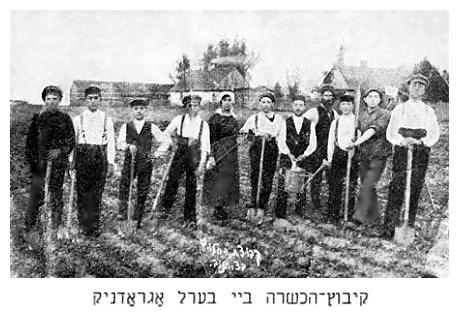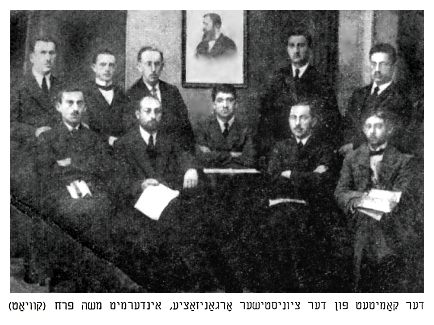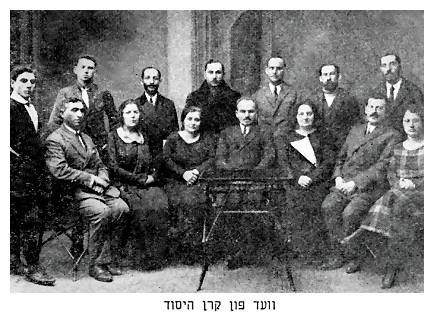
|
[Page 98]
Activities of the Zionist Organization
From amongst the older householders, the ones who showed understanding towards us were: Avraham Perlmutter, Dovid Wise, Moshe Rosenberg, Skurnik, Shlomo Rubinstein, Avraham Zilberstein.
The youth organized themselves and the first covert library was established in the private home of chaver Tchurek. Not all readers were of one mind. Some seized upon world literature and some the Yiddish. The reading was kept secret so anyone who was caught with a book by Achad Ha'am or Mapu in his hand – was immediately thrown out of the shtibl. .
In spite of all the difficulties, our group grew and we decided to meet once a week in order to deal with various issues. This Enlightenment Group became the foundation of the Zionist movement in Ciechanow.
An executive was elected. Shmuel Yaacov Cohen was president. In addition to the above-mentioned active ones, others were very active: Kirshenbaum, Wolf Levine, Chaim Berman, Avraham Rembom, Eliezer Templeholtz, Reuven Stufien, Dovid Gogol, etc. Shekalim were sold, pushkes were distributed, collections were made at every simcha. Hebrew press, such as Hatzfira, Hashaloach, were distributed. The Ciechanow Rov Trunk related sympathetically to the Hebrew press. The executive truly worked tirelessly.
[Page 99]
With the growth of the organization and the work, the question of promises arose. All our activities were illegal, so with the agreement of our mother we started to use our home with the home of Rivka Robota, and it was in her house that we had our covert library.
In the year 1909 I, together with my friend Yechezkl Trombka, took over the leadership of the Keren Kayemet (National Fund). How we worked can be illustrated by the fact that Ciechanow was declared first by the Central Committee. A cultural commission was established under the leadership of Shmuel Yaacov Cohen. With the move of the Kahana family to our shtibl, a new energy arrived. Through their initiative, the first Yiddish Theater came into existence in Ciechanow. With their arrival the Zionist organization revived. Their home became a warm home for all our friends, boys and girls.
After long efforts, we received legalization for the library. We called it Shaarei Tzion, and from that time on our open communal work began. From a cultural group we became a group of practical political Zionist workers. We enlarged our library, arranged public meetings; opened a Hebrew School, evening courses. Our influence in Ciechanow grew to such an extent that we were able to send our own delegate to the Zionist Congress in the year 1913, the female friend Ad Vinchitsky. In the Kehillah we had, as representatives, Moishe Parach and Yaacov Misher.
World War I broke out, and together with it came epidemics and hunger. Homeless filled Ciechanow. We especially suffered from the epidemics and hunger. Rov Landau Z”L was also one of the victims.
Our group immediately joined the (blank) committee. With much devotion the following worked: Shlomo Klinger, Tankhum Makover, Dvora Kviat and the Hasidic Jew, Reb Binyamin Malina.
The work went on night and day. With the self-sacrifice and work of these people, the epidemic stopped.
Besides the Zionists, all communal groups in Ciechanow did everything possible to help in the work.
The great need forced us to open a people's kitchen.
[Page 100]
It was started and at its helm were: Natan Garfinkle, Natan Berman and Shlomo Brenner.
When the Germans entered Ciechanow -- they were not so wild yet at that time -- cultural work increased. The following parties were formed: Poele Zion, Bund, and folk parties, as well as hand-workers groups, that arranged readings. We spread the Zionist idea amongst the people. Our speakers, Vaveh Burstein and Flutzer were outstanding.
Peace in the non-partisan culture house did not last long. The Zionist Youth left and founded the Tzirei-Tzion movement.
We also organized a sport club called “Maccabee” and a special instructor carried out exercises with our members. Hechalutz was also organized. It occupied itself with Hachshara (agricultural training) and with aliyah to the land of Israel. An agricultural school was opened at Berl Agradnik.

|
| Kibbutz Hachshara at Berl Agradnik's |
|
|
The Hechalutz was led by: Appelboim and Sh. Shvirer . A break in our activity happened when Poland got its independence. We started to feel that the ground is burning beneath our feet and many of our chaverim did indeed start to prepare for aliyah.

|
| The Zionist members of Ciechanow. The committee of the Zionist Organization |
|
|
[Page 101 - lower]

|
| Executive Committee of Keren Hayesod |
|
|
|
JewishGen, Inc. makes no representations regarding the accuracy of
the translation. The reader may wish to refer to the original material
for verification.
JewishGen is not responsible for inaccuracies or omissions in the original work and cannot rewrite or edit the text to correct inaccuracies and/or omissions.
Our mission is to produce a translation of the original work and we cannot verify the accuracy of statements or alter facts cited.
 Ciechanow,
Poland
Ciechanow,
Poland  Yizkor Book Project
Yizkor Book Project
 JewishGen Home Page
JewishGen Home Page
Copyright © 1999-2024 by JewishGen, Inc.
Updated 14 June 2003 by LA